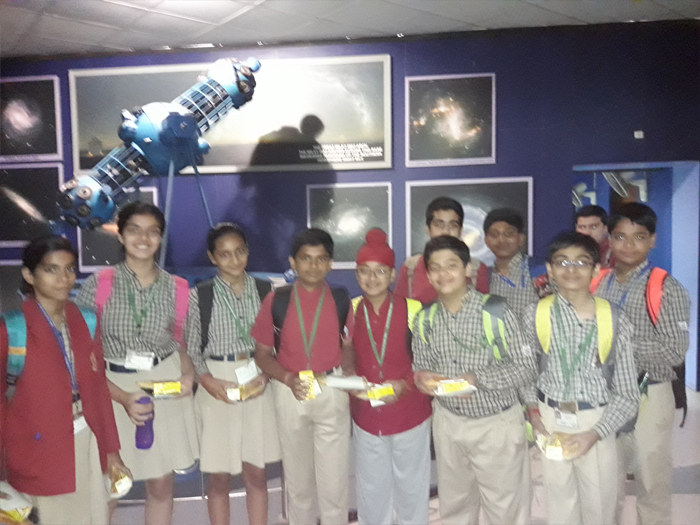An interaction with an astronomer at the Nehru Planetarium, class 8.
On 4th November 2016, 19 students of class 8 accompanied by their Physics' teacher, Ms. P. Yogeshwari were taken to the well-known Nehru Planetarium to attend a talk by Dr. Guillermo Blanc on the topic The Evolution of Galaxies.
On reaching the Planetarium, students of other schools as well as ours proceeded to view the exhibits displayed in the Planetarium.
After this, the students were asked to be seated in the auditorium where they were shown a video on light pollution. The video talked about various tools which were used in the olden times and preserved till date at places like Jantar Mantar. It also showed many star constellations in our night sky such as the Big Dipper, known as Ursa Major and in Hindi, as Saptarishi, as it has seven stars within it. Its tail points towards the pole star Dhruv Tara. This star lies on the axis of rotation of the earth and is always seen in the north (with respect to any place on earth).
[gallery link="file"]
Another constellation shown was Hercules, the hunter with a bow that points to Canis Major and Canis Minor, the two watchdogs in the night sky who have bright jewels as collar belts. Other constellations shown were Leo, Corvus and Aurviga which had interesting shapes. In addition to this, were shown the positions and symbols of the zodiac signs, namely, Aries, Taurus, Gemini, Pisces, Leo, Virgo and Scorpio, etc. Then we were introduced to the concept of light pollution, its causes and effects and how to arrest it. It told us that light pollution is a brightening of the night sky caused by street lights and other man-made sources. It has a disruptive effect on natural cycles and inhibits the observation of stars and planets. The video was quite informative and all the students enjoyed viewing it!
Following this was a talk by Dr. Blanc, an assistant professor in the astronomy department at the University of Chile. He shared a powerpoint presentation on the Milky Way Galaxy, the birth of galaxies, the expanding universe, Hubbles Law, dark energy, dark matter and measures to control light pollution. Dr. Blanc informed us that the universe has billions of galaxies of which we only know a few! According to him, we have got to know more about these galaxies through telescopes, especially the Hubble Space Telescope. He told the students that they cant see some of the galaxies even with the help of telescopes, as the dust clouds in our galaxies block the view. Also, some galaxies seem less bright and smaller than others because they are far away from us. He told us that the galaxies outside our own, are moving away from us, and the ones that are farthest away are moving the fastest. This means that no matter what galaxy you happen to be in, all the other galaxies are moving away from you. He also told us that this expansion is happening at an accelerating rate.
During the discussion, Dr. Blanc mentioned that one can see the past with the help of telescopes as, when they take a picture of a galaxy a 100 million light years away from us, we are actually viewing it as it looked like a 100 million years ago. He informed students about the many new telescopes being built, which can look farther back into history than we can right, now like the European Extremely Large Telescope in northern Chile, the Thirty Metre Telescope in Hawaii, the Giant Magellan Telescope in Chile and the James Web Space Telescope in space.
Dr. Blanc talked about dark energy and dark matter. Dark Energy is the force which opposes gravitational force and causes the universe to expand at an accelerating rate and prevent it from collapsing while Dark Matter is something which is not visible to us but has mass and plays an important role in the formation of galaxies. Dark Energy makes up 68% of the whole universe and Dark Matter 27%. The normal matter, that is the sun, stars, planets etc. makes up only 5% of the universe!
None of us realised how the time slipped as we listened in awe to the facts shared by Dr. Blanc and soon, it was time to return to School, but the session at the planetarium left quite an impression on each one present!
Rishika Makwana, class 8D.













